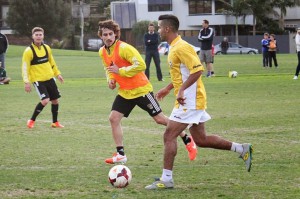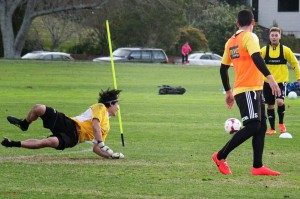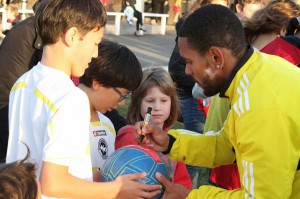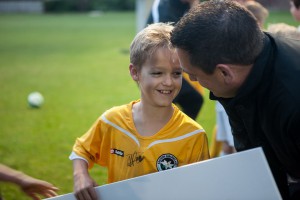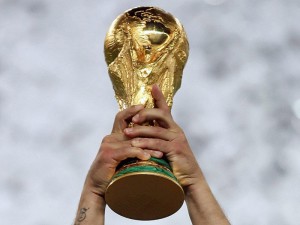What are we trying to achieve?
I was asked recently by a coach/parent of a 9-year-old Suburbs player, “what are we trying to achieve at Eastern Suburbs?” This was in reference to the Junior/Youth training and playing program at the club. My answer was simple – we want all players to enjoy their time at Eastern Suburbs whilst giving them the best possible opportunity to reach their potential as a player.
From an enjoyment perspective we attempt to arrange many teams based on friends requests and try and arrange competitions that are as even as possible so everyone can experience winning and losing. There will always of course be the strongest and the weakest team(s), such is sport. From a development perspective we offer many coaching programs, coach education, and extra competition for the elite and a variety of other things to assist players reaching their potential. One of the biggest obstacles to player development sadly can be the game itself, and the perception from parents around the measurement of improvement. It can also be one of the best development tools. Let me explain.
Football like most things is a learned activity. With regards to development we measure a person in regards to what he or she can do in relation to the best. For example, the measure of IQ is an intelligence measurement in relation to your age and the mental ability of other humans. Many of you will have had children at school that undertake NSW testing that show they have a reading age of an “X” year old. We measure the ability of a pianist on how well he or she can play and have a grading system to work through which gets progressively more difficult. What we as humans seem to do instinctively is try and encourage our children to learn an activity as quickly as possible and get great satisfaction when our kids excel at something and become significantly better than their peers at the same age. My experience however is that irrespective of where your child fits into the evolutionary scale of whatever activity they are undertaking, we as parents enjoy seeing them improve. I also believe the children get more enjoyment when they are learning.
The involvement in team sports is a very “kiwi” thing to do. There are so many positive aspects that many of us probably don’t fully appreciate. We understand the physical aspect around healthy living, and starting this at a young age is very good. Being “part of a team” and not letting your team mates down by being reliable/punctual. Giving your best for the team. Understanding and dealing with winning and losing. It is also a family activity with Mum and Dad, often sisters and/or brothers on the sideline all supporting the participant as well as the rest of the team. This is genuinely “quality time” in a forever more fast paced “online” life that we now live.
The problem is how do we measure progress? It is easy to measure enjoyment; the kids are either happy or sad. They either want to play or they don’t. Obviously we as parents can impact this as well. Shouting on the sideline or telling your child all the things they did wrong during the game will naturally have a negative influence. Fortunately I don’t think this happens too often (but does happen). But from a progress perspective what we would like to see is no different to any other activity and that is for player’s to display traits that you would expect from players older and better than themselves. So what are those traits?
Before I answer that I would like you to ask yourself as a parent whether you know the answer to that question.
For many parents the major measurement devices they recognise in relation to football are:
• Goals scored/shots
• Goals conceded/saves
• Won/Lost
• Tackles made
Sadly, these things have no bearing on whether your child is improving or not. Although it is of course a team game, in the developmental Junior and younger Youth years we focus on teaching the individual skills required to master the ball, and introduce the tactical appreciation required as they acquire these skills. The difficulty is of course that during the process of learning these skills, many mistakes are made. The consequence of these mistakes and where on the field they are made, can impact greatly on the result of the game.
This leaves us with two choices:
1. Focus on instructing the children in games to avoid risking use of underdeveloped skills that could cause mistakes, and greatly increasing their chances of winning or;
2. Encouraging them to try their underdeveloped skills in the game as well as training and accept willingly the consequence that losing will / may be a by product in the immediate term.
At Eastern Suburbs, in an attempt to achieve our goal of having our players reach their potential, we are choosing the second option. If every team did the same thing then the winning/losing by-product would in fact be nullified. And if winning is a large component of the enjoyment factor (I don’t necessarily think it is, it is more related to the environment created within the team) then this also should balance if everyone takes on board the same philosophy.
So as a parent if I am not to judge the players improvement or progress by goals scored/conceded, games won/lost, tackles made shots saved, then what do I judge it on? Here are some of the things that we like to look out for at a young age (not in any particular order).
First touch, technique whether passing, or shooting, ability to use both feet, composure on the ball, movement with or without the ball, athleticism, close control / dribbling, coordination, “tricks”, decision making, accuracy, playing with head up, recognition and utilisation of space, speed, confidence on the ball. There are many more.
For many parents not brought up on the game of Football, the ability to recognise some or all of these attributes is near on impossible. It is in its own unique way like a different language you hear but occasionally recognise individual words. The tendency is to think when a team wins they played well, and when they lose they didn’t play well. But within that win or loss there will have been skills displayed as listed above that were performed very well at times, and others performed poorly, by both teams. Focusing your praise on the important skills and attributes displayed well (win or lose) is far more important than recognising either the result or trying to avoid mistakes that may impact the result. If you don’t have the knowledge or experience to recognise these attributes, you are much better saying nothing as you may well be unwittingly applauding actions which are detrimental to the progress of your player.
Let me give you an example which I see all the time. The ball comes to a player in defence with very little pressure on him/her, and the ball is kicked a great distance forward. Parents clap, danger is gone because the ball is further from the defenders goal and occasionally the ball goes directly to a striker on the same team who is now in a goal scoring position. If I relate that to how the game should be played based on how the best players play the game (and remember we are trying to develop our players by emulating what good players do) what do I want to see? Firstly the player controls the ball. Secondly he/she then makes a conscious decision to dribble or pass based on the space and players around. Once the ball has been accurately released he/she makes a run to support that player.
Unfortunately taking this course of action gives the player several opportunities to make a mistake and give the ball away in a dangerous area. And when that mistake occurs it could well be costly for the team. However if the parents on the sideline applaud when he/she belts the ball down the field, the next time they are in the same position they will do exactly the same thing because he/she enjoys the adulation received as a result of the action. From a development perspective an opportunity is missed to undertake a course of actions that will require several different skills which when mastered will make him/her a significantly better player than one that can only kick the ball a long way. This is one example.
So as a parent what should you do? Firstly recognise in its most basic form, football is a game where you try and keep the ball. I don’t mean the individual keeps the ball, but the team keeps the ball. This is done by either passing or dribbling around and through the opposition. From a development perspective it is better to lose ground and keep the ball, than gain ground and lose it. One of the problems with the game from a development perspective is that the goal is like a giant magnet. Players for some reason come hell or high water need to get the ball towards the opposition goal preferably through the shortest possible route. If this involves somehow going directly through opposition player’s bodies then so be it. When you watch the top players playing they look to work their way around the opposition, creating gaps to play through by clever manipulation of the ball player movement and speed. If something is not working they retreat and then start again looking to probe and puncture until something opens up which can be exploited. These top players have developed the attributes required through many thousands of hours of practise and countless mistakes and failures. But they eventually learnt from those mistakes and good coaching.
In most top football academies around the world the parents if allowed at games are required to remain silent. The parents watch quietly, just as they would if they went to their child’s school to observe them learning in the classroom or playing in the orchestra. We are not a top academy, but recognise that if we want our players to reach their potential we too might emulate some of the things that organisations better than us undertake. So what we’d like Eastern Suburbs parents to do is come to your child’s game, enjoy a coffee and a chat, and just let the kids do their thing. Remember, they’re not there for your entertainment, they’re there for theirs.
If they can be left alone and applauded for the right reasons, the game can become one of the best development tools of all.
Thank you,
Chris Ruffell

